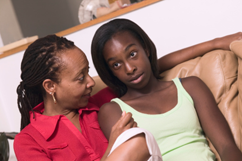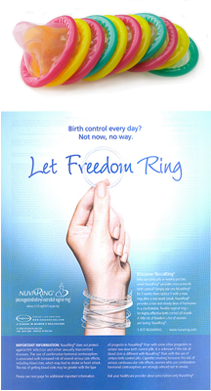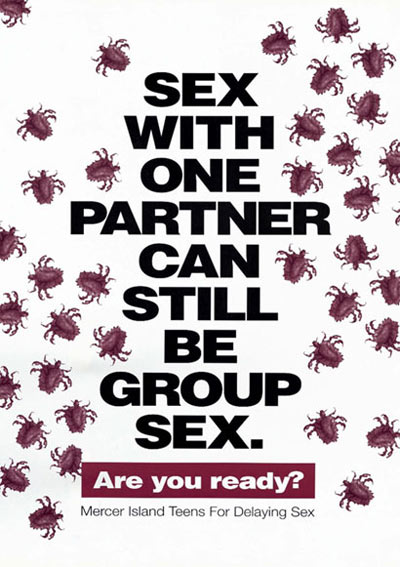SAFER SEX
If given their choice in the matter, most of us as parents would want our children to wait to have sex or practice abstinence. However, to be realistic, not every teen is going to wait.
The Centers for Disease Control and Prevention (CDC) tell us that data based on their 2009 survey involving more than 16,000 high school students throughout the country shows that:
Also see:
http://www.guttmacher.org/pubs/fb_contr_use.html
BACK TO TOP
 Recent (2010) national statistics (http://www.guttmacher.org/pubs/fb_contr_use.html)
indicate that nearly half (46%) of all 15-19 year olds have had sex at least once.
Recent (2010) national statistics (http://www.guttmacher.org/pubs/fb_contr_use.html)
indicate that nearly half (46%) of all 15-19 year olds have had sex at least once.
Thinking about when teens become more sexually active, we find that:
BACK TO TOP
 Contrary to popular belief, telling your children about contraception isnít going to
lead them to go right out there and ďdo it!Ē Studies of comprehensive sex education
programs that tell teens how to protect themselves if they should decide to become
sexually active are clear in their results. Research results show that these programs:
Contrary to popular belief, telling your children about contraception isnít going to
lead them to go right out there and ďdo it!Ē Studies of comprehensive sex education
programs that tell teens how to protect themselves if they should decide to become
sexually active are clear in their results. Research results show that these programs:
http://www.advocatesforyouth.org/index.php? option=com_content&task=view&id=450&Itemid=336
BACK TO TOP
For a quick and easy-to-read overview of contraceptive options available, we advise you to check out this pamphlet produced by the Washington State Department of Health. You can find this helpful pamphlet at:
http://here.doh.wa.gov/materials/birth-control-choosing-the-method-thats-right-for-you
This pamphlet contains information about 14 commonly-used birth control methods. It tells you how each method works, when to use it, how to obtain it, advantages and disadvantages, and known side effects. Each method has a quick reference guide to STD/HIV protection and birth control effectiveness.
BACK TO TOP
You are a very important person in your teenís life. Never minimize your role. When it comes to decision-making about sex, love and relationships, you have a very key role to play.
Here are some tips you may want to consider in talking to your teen:

BACK TO TOP
Some STDs have symptoms that can be recognized but many have mild symptoms or no symptoms at all! Itís very possible to have an STD and yet be totally unaware of this fact.
One of the things to discuss with your teen is the fact that whenever a person has sex with a partner, (s)he is potentially also having sex with all that partnerís previous partners. The potential for contracting an STD continues to increase as the numbers of partners increase.
One teen designed a poster to depict this issue in a more graphic way, using a parasite that he found particularly disgusting to illustrate his point.

It is highly recommended that partners considering becoming sexually active go and get tested first and then wait for the results before taking this very important step. Once they have completed testing, then itís important, of course, for each of them to stay faithful to that one partner.
Suppose that waiting didnít happen; itís very important that both partners go for testing and, if required, treatment.
If your son or daughter receives treatment, itís important to stress that this treatment does not guarantee that they are now immune to getting the STD again. Itís very important to use protection as a preventive measure if they are going to continue to have sex.
Stress to your teen that re-infection is always a possibility, and treatment will once again be required should that occur. Emphasize to your teen the importance of using protection correctly and using it each and every time they have sex.
BACK TO TOP
If given their choice in the matter, most of us as parents would want our children to wait to have sex or practice abstinence. However, to be realistic, not every teen is going to wait.
The Centers for Disease Control and Prevention (CDC) tell us that data based on their 2009 survey involving more than 16,000 high school students throughout the country shows that:
- Nearly half (46%) of all teens report having had sex at some time.
- More than one third (34%) are currently sexually active (that is, they have had sex in the past three months)
- 3 in 10 girls in the U.S. get pregnant at least once by age 20
- 1 in 4 sexually active teens will get an sexually transmitted disease every year
- A sexually active teen that does not use contraceptives has a 90% chance of becoming pregnant within a year.
Also see:
http://www.guttmacher.org/pubs/fb_contr_use.html
BACK TO TOP
 Recent (2010) national statistics (http://www.guttmacher.org/pubs/fb_contr_use.html)
indicate that nearly half (46%) of all 15-19 year olds have had sex at least once.
Recent (2010) national statistics (http://www.guttmacher.org/pubs/fb_contr_use.html)
indicate that nearly half (46%) of all 15-19 year olds have had sex at least once.Thinking about when teens become more sexually active, we find that:
- By age 15, only 13% of never-married teens have ever had sex
- However, by the time they reach 19, seven in 10 of never married teens have engaged in sexual intercourse.
- Most have sex for the first time at about age 17 but they do not marry until their middle or late 20s.
BACK TO TOP
 Contrary to popular belief, telling your children about contraception isnít going to
lead them to go right out there and ďdo it!Ē Studies of comprehensive sex education
programs that tell teens how to protect themselves if they should decide to become
sexually active are clear in their results. Research results show that these programs:
Contrary to popular belief, telling your children about contraception isnít going to
lead them to go right out there and ďdo it!Ē Studies of comprehensive sex education
programs that tell teens how to protect themselves if they should decide to become
sexually active are clear in their results. Research results show that these programs:- Do NOT INCREASE the numbers of teens who start having sex after they hear this information
- DO NOT lower the age at which teens start having sex
- DO NOT increase the frequency of sex or the numbers of sex partners among those teens who are sexually active
http://www.advocatesforyouth.org/index.php? option=com_content&task=view&id=450&Itemid=336
BACK TO TOP
For a quick and easy-to-read overview of contraceptive options available, we advise you to check out this pamphlet produced by the Washington State Department of Health. You can find this helpful pamphlet at:
http://here.doh.wa.gov/materials/birth-control-choosing-the-method-thats-right-for-you
This pamphlet contains information about 14 commonly-used birth control methods. It tells you how each method works, when to use it, how to obtain it, advantages and disadvantages, and known side effects. Each method has a quick reference guide to STD/HIV protection and birth control effectiveness.
BACK TO TOP
You are a very important person in your teenís life. Never minimize your role. When it comes to decision-making about sex, love and relationships, you have a very key role to play.
Here are some tips you may want to consider in talking to your teen:
- Learn more for yourself about contraception options available;
- http://here.doh.wa.gov/materials/birth-control-choosing-the-method-thats-right- for-you

- Learn about sexually transmitted diseases (STDs)
http://here.doh.wa.gov/materials/sexually-transmitted-diseases/ 14_STDs002_E07L.pdf Find out about sexually transmitted diseases. Learn some of the risks involved with these various diseases and also about testing and treatment available. - Donít assume anything.
Donít assume that your teen knows about contraceptives or how to use them. Even if you suspect that they may have heard information somewhere, donít assume that your teen knows everything he/she need to know or wants to know. Also donít assume that everything he/she has heard is accurate. Another teen or the media may be the main source of information theyíre relying on! - Explain your own values and feelings
This is an excellent time to share your values about contraceptive use. Taking responsibility and protecting yourself and your partner are some of the issues you may choose to discuss. You may also want to talk about hopes and dreams for the future, including here how these can be impacted by becoming a teen parent. - Discuss contraceptive options with your teen.
Your teen needs information. Remember Knowledge is Power. Giving this information doesnít mean your child is now going right out to use it. Share with your teen where (s)he can go for further information as well as confidential services such as STD testing. Talking with your teen can help you feel more confident that they would have further ideas as to how to make a more informed decision should they choose to become sexually active. - Make sure that your teen understands that oral and anal sex are also considered sex.
Many teens think that only vaginal sex is considered sex. Be clear that sexually transmitted diseases are transmitted through vaginal, anal and oral sex. Oral and anal sex also require protection!
For more information about oral and anal sex and protecting oneself, see: http://www.pamf.org/teen/sex/std/oral/ http://www.cdc.gov/hiv/resources/factsheets/pdf/oralsex.pdf http://www.cdc.gov/hiv/resources/qa/transmission.htm - Stress the importance of using the method of choice correctly every single time!
One of the biggest problems teens may encounter in contraceptive use is not using the method of choice correctly and not using it every single time. Teens will report that ďit just happened!Ē Well, babies and/STDs can just happen also!
Emphasize to your teen the importance of planning ahead so that when theyíre actually placed in the situation, they have a plan of action. Itís not like the movies or that show they saw on TV. There can be some pretty big consequences when all that spontaneous passion that they see depicted on the screen happens to them in real life!
BACK TO TOP
TALKING TO YOUR TEEN ABOUT GETTING TESTED ... SEE STDS
Some STDs have symptoms that can be recognized but many have mild symptoms or no symptoms at all! Itís very possible to have an STD and yet be totally unaware of this fact.
One of the things to discuss with your teen is the fact that whenever a person has sex with a partner, (s)he is potentially also having sex with all that partnerís previous partners. The potential for contracting an STD continues to increase as the numbers of partners increase.
One teen designed a poster to depict this issue in a more graphic way, using a parasite that he found particularly disgusting to illustrate his point.

It is highly recommended that partners considering becoming sexually active go and get tested first and then wait for the results before taking this very important step. Once they have completed testing, then itís important, of course, for each of them to stay faithful to that one partner.
Suppose that waiting didnít happen; itís very important that both partners go for testing and, if required, treatment.
If your son or daughter receives treatment, itís important to stress that this treatment does not guarantee that they are now immune to getting the STD again. Itís very important to use protection as a preventive measure if they are going to continue to have sex.
Stress to your teen that re-infection is always a possibility, and treatment will once again be required should that occur. Emphasize to your teen the importance of using protection correctly and using it each and every time they have sex.
BACK TO TOP